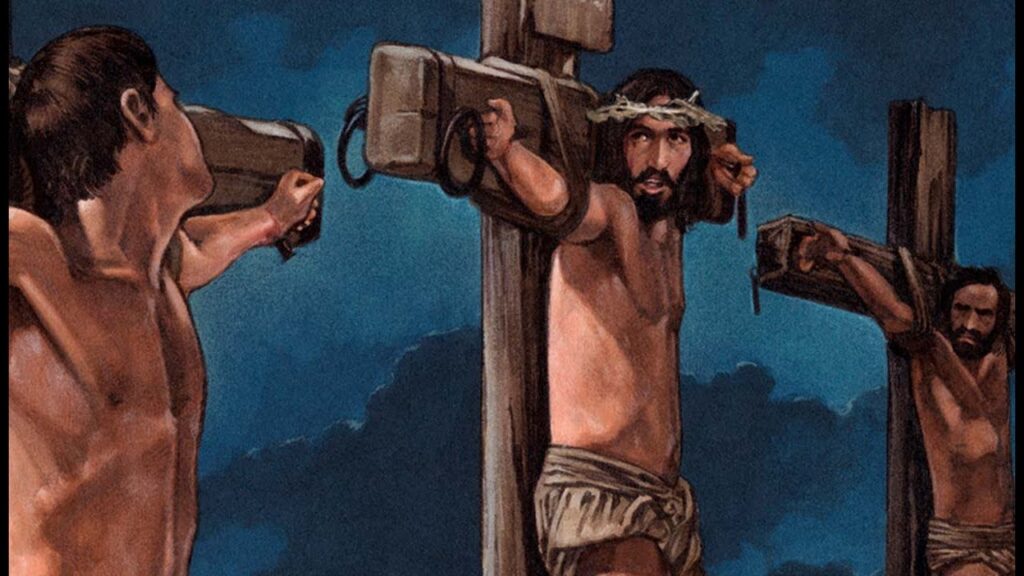
To listen to today’s reflection as a podcast, click here
Each weekday in the month of August, we will pursue “prepositional truth” by zeroing in on a single Greek preposition in a single verse, noting the theological richness so often embedded in the humble words we so often overlook.
Four words.
That’s all the Bible gives us in answer to one of our most pressing questions.
We know all about the promise of the new creation – the new heavens and new earth where God’s people will dwell forever. God himself will “wipe every tear from their eyes. There will be no more death or mourning or crying or pain, for the old order of things has passed away” (Revelation 21:4). That’s a preview of the end of history.
In the meantime, what happens to those who die? If this is your last day on earth, what will you be experiencing tomorrow?
This is what theologians call the mystery of the Intermediate State. What is the condition of Christ-followers between their last moments in this world and God’s new creation?
All we have are four words.
According to Scripture, those who belong to Jesus by “believing into him” will open their eyes after death and discover they are “with him in Paradise.”
Luke tells us that Jesus was crucified between two thieves. One of them is cynical to the end. But the other, with humble hopefulness, says, “Jesus, remember me when you come into your kingdom.” Jesus responds, “I tell you the truth, today is going to be the best day of your life.”
From one perspective, the thief who comes to faith on the cross is the most frustrating character in the Bible. He ruins everybody’s theology.
Those who are certain that you have to be baptized (and with a certain volume of water) to go to heaven can’t get around the fact that baptism was never something he was able to receive. Those who believe that you really haven’t lived unless you receive a special filling of the Holy Spirit accompanied by speaking in tongues cannot pretend that he ever had such an experience.
This poor man never got to choose between hymns and praise choruses, pipe organs or guitars. He never got to debate End Time scenarios.
He never went to Vacation Bible School with the Methodists or experienced the seasons of the church year with the Lutherans. He never knelt with the Episcopalians, attended a revival meeting with the Pentecostals, explored the wonders of Catholic liturgy, or sneaked into a General Assembly meeting of Presbyterians to find out what they were really doing.
From another perspective, however, the thief who comes to faith on the cross is the most encouraging character in all of Scripture.
He doesn’t have a single spiritual bargaining chip. He has no Sunday School attendance pins. He has no track record of prayer or service. He cannot meaningfully say, “From now on, I promise to live a better life.” He’s just minutes away from reaching the finish line.
Everything in his world has come to a shattering, horrific conclusion. All he has is a broken spirit and one request: “Jesus, remember me when you come into your kingdom.”
And Jesus responds, “Truly I say to you, today you will be with (META) me in (EN) Paradise” (Luke 23:43).
Which is another way of saying, “On this, on the worst day of your life, you are going to experience the best thing that has ever happened to you. No waiting. No forms to fill out. No new member classes to take. Get ready to be engulfed by a tsunami of God’s grace.”
We don’t know precisely what Jesus meant by Paradise. The Bible provides no descriptions or explanations.
But we have every reason to believe we will not be disappointed.
There is one other Bible text concerning the Intermediate State. It comes from the pen of the apostle Paul as he was writing what scholars call “the happiest book of the New Testament,” his correspondence with the fledgling church at Philippi.
Paul is in prison. Many first century jails were so dreadful that being thrown into one was virtually a death sentence. But Paul is effervescent. “Rejoice in the Lord always,” he says. “I will say it again, rejoice!” (Philippians 4:4).
He wonders if this is the end of the road. Maybe God is calling him home. Or maybe God is going to spring him from prison and allow him to ramp up his ministry to the Philippians. Which option is best? “I am torn between the two,” he writes. “I desire to depart and be with Christ, which is better by far; but it is more necessary for you that I remain in the body” (1:23-24).
There’s that “with” formula again. As Paul puts it two verses earlier, “To live is Christ and to die is gain.” How can he possibly think such a thing?
It’s because dying automatically brings him into the presence of the One who loves him. Here the preposition is SUN – a Greek word echoed in English words like “symphony” (all the instruments playing with each other) and “sympathy” (sharing feelings with another person).
New Testament scholar Murray J. Harris points out that META and SUN had become virtually synonymous in the first century.
What does SUN imply in Philippians 1:23? Christians aren’t merely granted entrance to the same general next-world space as Jesus, but, as Harris puts it, they will experience “dynamic, mutual fellowship ‘with’ their risen Lord.”
Altogether, Scripture doesn’t give us many clues about what to expect at the end of life.
Four words. That’s all we’ve got.
And two of them are just ordinary, run-of-the-mill prepositions.
But because the other words are “Christ” and “Paradise,” it’s hard to imagine receiving any greater assurance as the hour approaches in which we ourselves will take our final breath.
